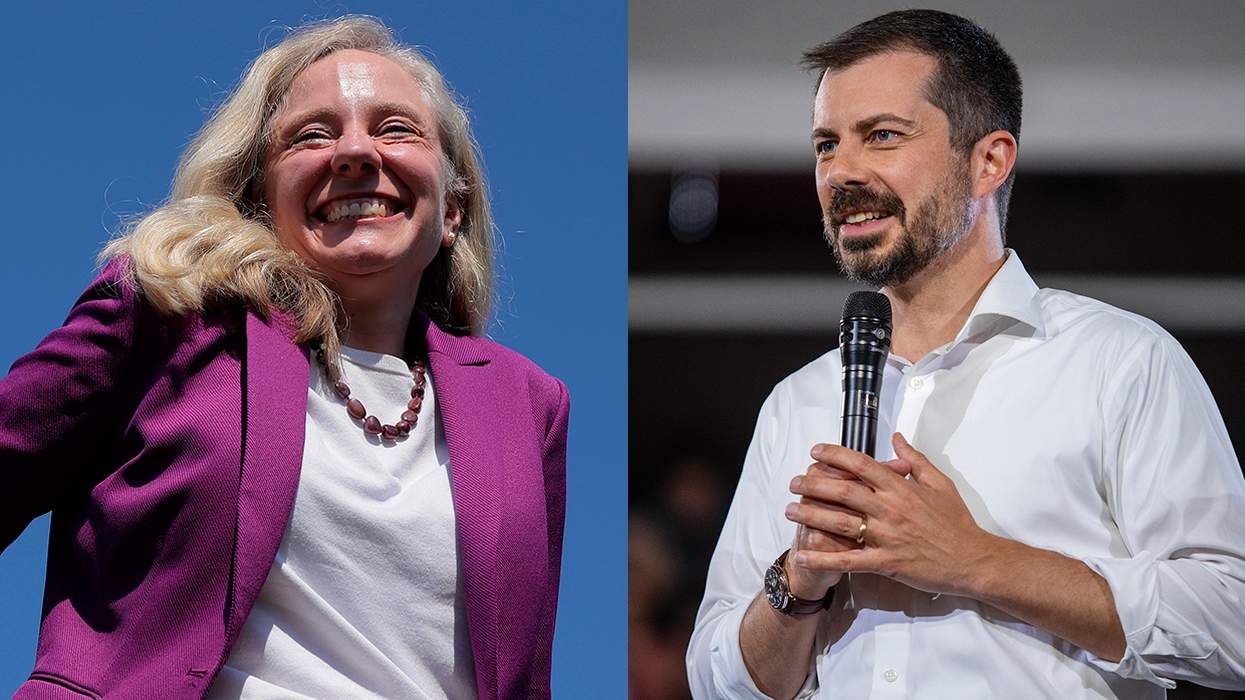Where the 2020 Democratic Candidates Stand on LGBTQ Issues
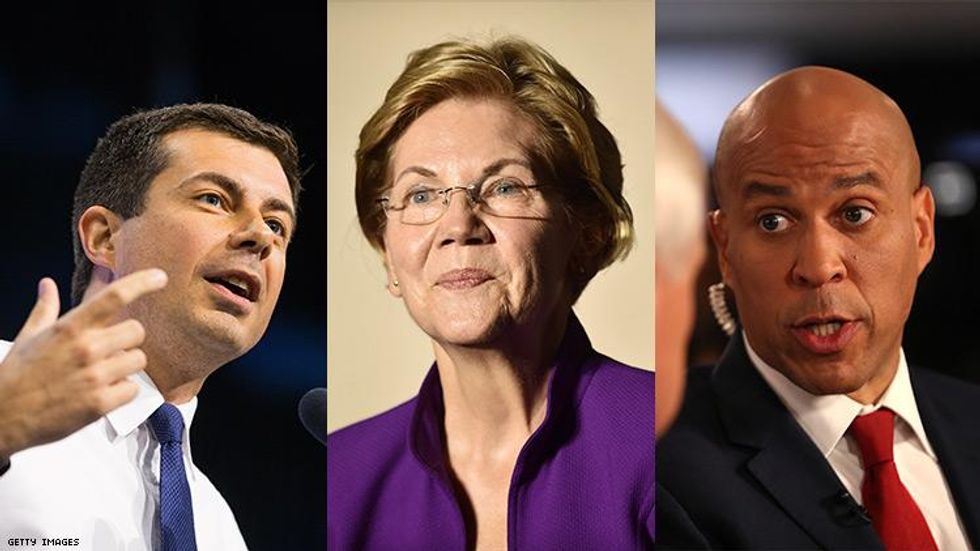
Thursday, nine candidates for the Democratic presidential nomination will appear in Los Angeles for the Human Rights Campaign Foundation's Power of Our Pride Presidential Town Hall, to be televised on CNN beginning at 7 p.m. Eastern.
The candidates scheduled to appear are Elizabeth Warren, Cory Booker, Pete Buttigieg, Joe Biden, Kamala Harris, Julian Castro, Amy Klobuchar, Beto O'Rourke, and Tom Steyer.
This is the second LGBTQ-focused event of the 2020 election cycle. The first was the LGBTQ Presidential Forum, held September 20 in Cedar Rapids, Iowa, and sponsored by The Advocate, The Gazette, One Iowa, and GLAAD. It featured 10 candidates: Warren, Booker, Buttigieg, Biden, Harris, Castro, Klobuchar, Tulsi Gabbard, Joe Sestak, and Marianne Williamson.
Here, we look at where the candidates who have appeared at either event stand on our issues. The only major candidate to skip both forums is U.S. Sen. Bernie Sanders of Vermont, who cited a scheduling conflict for the first, and then committed to appear for Thursday's event, but now has canceled due to health problems.
Elizabeth Warren
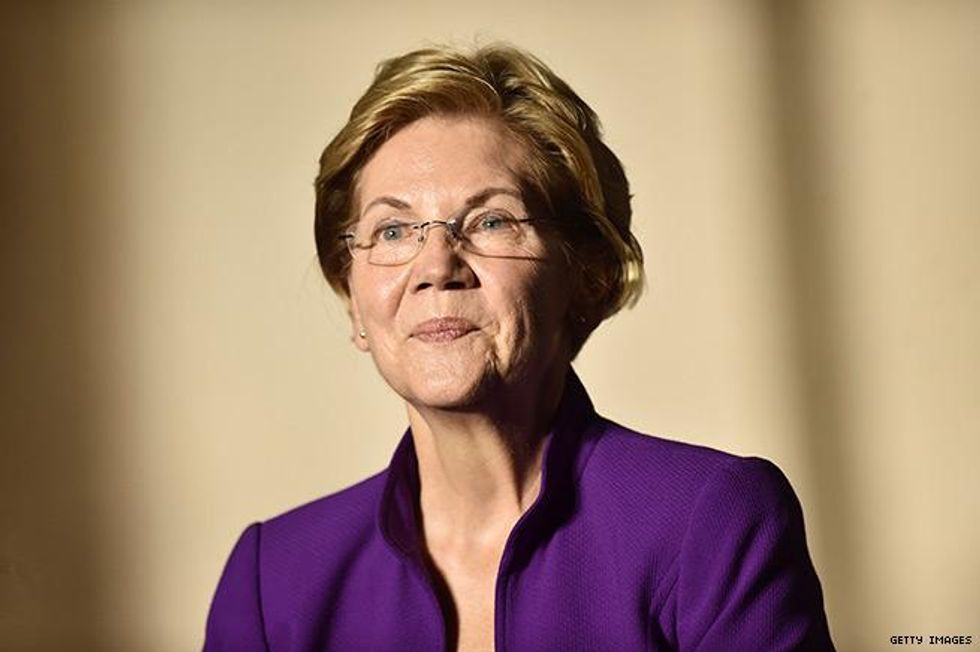
The U.S. senator from Massachusetts has a long record of LGBTQ advocacy. She was an early supporter of marriage equality and of the Employment Non-Discrimination Act; in her first year in office, 2013, she gave a speech on the Senate floor urging her colleagues to pass ENDA, which would have instituted a nationwide ban on employment discrimination based on sexual orientation or gender identity. It's never passed both houses of Congress in the same session, and it's now been superseded by the pending Equality Act, which includes housing, public accommodations, and other aspects of life in addition to employment. Warren is a strong supporter of the Equality Act. She also has denounced Trump's attempts to bar transgender people from the military, supported efforts to classify conversion therapy as fraud, and called for an end to discrimination against gay and bisexual men who wish to donate blood. This year, she spoke to the one blot on her LGBTQ record, a 2012 statement that court-ordered gender-confirmation surgery for a transgender prisoner was not a good use of tax dollars. Her campaign staff said she supports access to all medically necessary procedures, including transition-related ones, for prisoners and everyone else. She also showed solidarity with trans people by listing her preferred pronouns on her Twitter profile.
"Elizabeth is committed to standing side-by-side with LGBTQ+ people until each and every person has a fighting chance to build a brighter future for themselves and feels safe to be who they are," her campaign website states. "Equal is equal." The site notes her support for the Equality Act as well as the Do No Harm Act, which would prevent religious liberty from being used as an excuse for discrimination, and the Refund Equality Act, which would allow same-sex couples to file amended returns for the years they were denied the right to file federal taxes jointly because of the Defense of Marriage Act. It also points out that she wants to provide universal health care coverage by expanding Medicare to all Americans, and that care would be provided without any discrimination against LGBTQ people.
Cory Booker
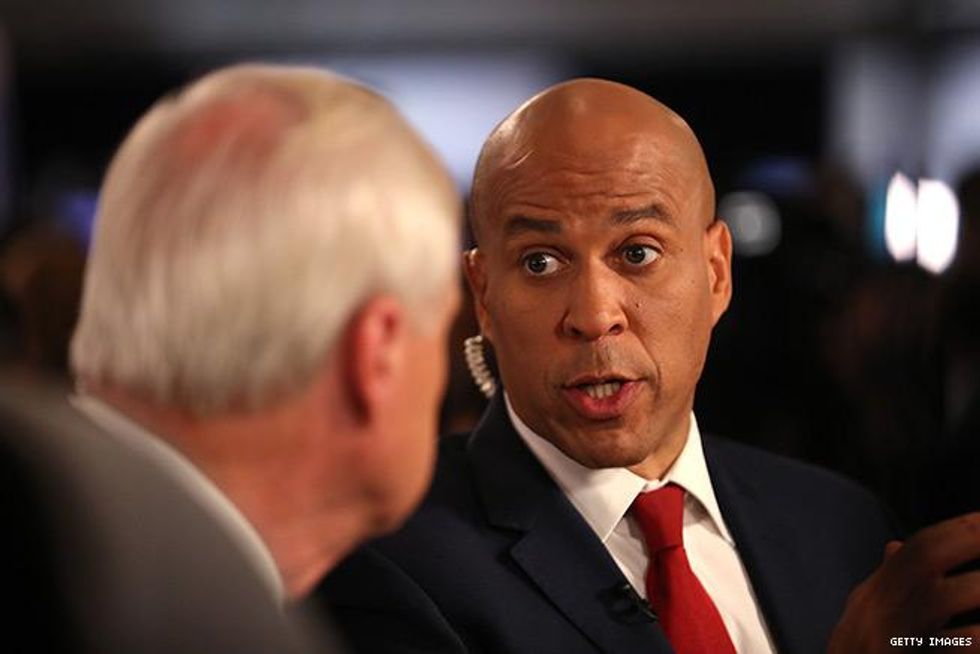
U.S. Sen. Cory Booker of New Jersey is another longtime LGBTQ ally, going as far back as his years as a student at Stanford University -- but he's noted that he had to overcome homophobia. In 1992 he wrote a column for The Stanford Daily, the student newspaper, discussing what it took -- a meeting with a gay counselor, for one thing -- to go from merely tolerating LGBTQ people to embracing them. The paper republished the column in 2013. As mayor of Newark from 2006 to 2013, he was an advocate for LGBTQ equality, and one of his last acts in that office was to perform one of New Jersey's first legally recognized same-sex marriages -- and he shut down a heckler while he was at it. As a senator since 2013, he has been a reliable champion of LGBTQ causes; among other things, he's an original cosponsor of the Equality Act. He has grilled many of Donald Trump's appointees on LGBTQ issues in Senate hearings, and he has been outspoken about the violence faced by transgender women of color. He wrote a column for The Advocate on the latter topic, and he has recently revealed that he has a nonbinary relative, whom he calls a "niephew," who has helped inform his understanding of gender issues. A bachelor, Booker has sometimes been asked if he's gay; he says he's heterosexual but prefers to keep his private life private. His desire for privacy, however, hasn't stopped media outlets from reporting that he's in a relationship with actress Rosario Dawson.
Booker has pledged that if he becomes president, he will immediately end Trump's ban on military service by transgender people and rescind the administration's "religious refusal" rules, which allow health care providers to discriminate against LGBTQ people and others who offend their religious sensibilities. He also has promised to continue championing the Equality Act.
Pete Buttigieg
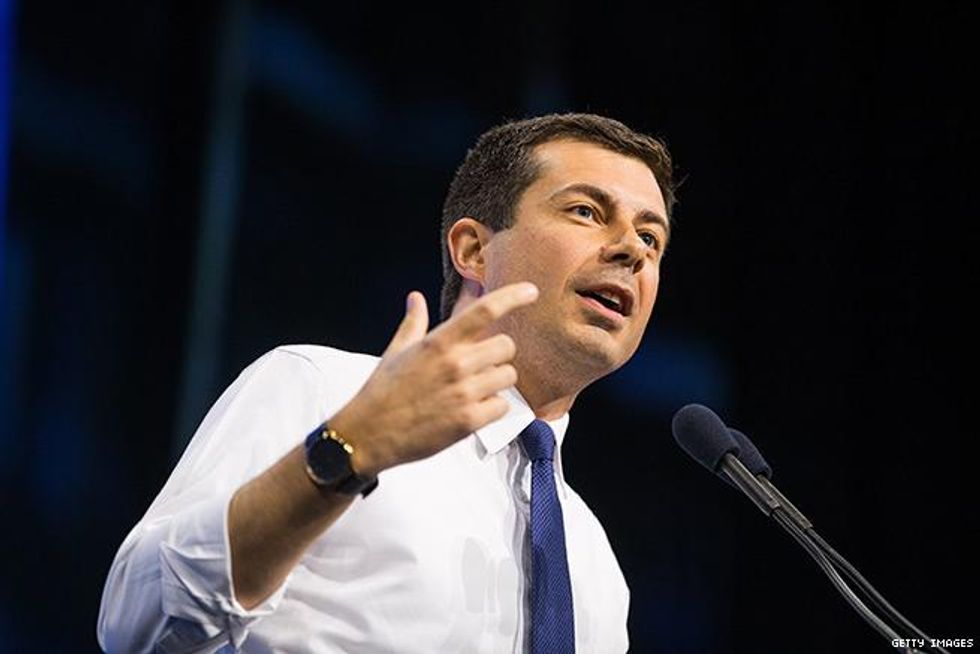
Pete Buttigieg, the mayor of South Bend, Ind., isn't simply an LGBTQ ally, he's a member of the LGBTQ community. As only the second openly gay major-party presidential candidate in U.S. history (the first was Republican Fred Karger, in 2012), Buttigieg has put a face on LGBTQ issues for voters. He has made history by being the first out candidate in a national presidential debate, as Karger never made the cut during his run, and by telling his coming-out story on the debate stage. During last week's debate in Houston, which closed with moderators asking each candidate to tell a story of setbacks and resilience, Buttigieg said, "As a military officer serving under 'don't ask, don't tell,' and as an elected official in the state of Indiana when Mike Pence was governor, at a certain point, when it came to professional setbacks, I had to wonder whether just acknowledging who I was was going to be the ultimate career-ending professional setback. I came back from the deployment and realized that you only get to live one life. And I was not interested in not knowing what it was like to be in love any longer, so I just came out." His coming-out happened in 2015, when he was running for a second term as mayor, and it proved to be no liability, as he was reelected easily. He was an LGBTQ advocate even before coming out, as he shepherded an inclusive antidiscrimination ordinance to passage in South Bend early in his tenure as mayor, and he spoke out against the "religious freedom" bill signed into law by Pence a few months before Buttigieg's coming-out; the measure was widely seen as enabling discrimination, and it was amended to ostensibly prevent that from happening. It should be noted that Buttigieg has had a fraught relationship with some other marginalized communities; for instance, he has been much criticized for demoting a Black police chief. But the mayor has said he is committed to fighting systemic racism.
On LGBTQ rights, Buttigieg has said that as president he will make it a priority to pass the Equality Act, reverse the transgender military ban, and enforce the nondiscrimination provisions of the Affordable Care Act and other federal laws. He has also pledged to combat bullying, protect LGBTQ asylum-seekers, pass safe schools legislation, and champion LGBTQ rights around the world. And Thursday, he released a comprehensive plan to address LGBTQ issues as well as HIV and AIDS.
Joe Biden
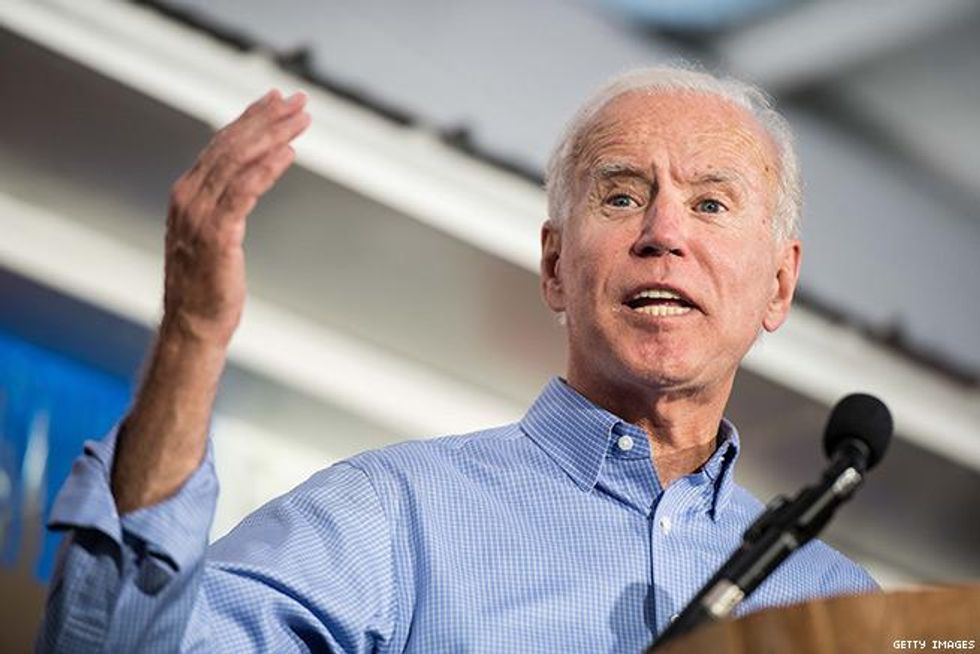
Some voters may have problems with Joe Biden for a variety of reasons, but over the course of his career he has become a reliable LGBTQ ally. Barack Obama's vice president, and before that a longtime U.S. senator from Delaware, Biden has evolved on LGBTQ issues. In 1993, when the new president, Bill Clinton, was trying to repeal the ban on lesbian, gay, and bisexual people in the military and met great resistance, then-Sen. Biden voted for the compromise of "don't ask, don't tell," which was supposed to make things better for LGB troops but didn't, as they still had to be closeted and live in fear of discharge. By the time he became vice president, Biden said DADT had to go, and Congress and Obama saw that it did. Also as a senator in the 1990s, he voted for the Defense of Marriage Act, which banned federal recognition of same-sex marriages and allowed any state to refuse to recognize such marriages from other states. Many other Democrats supported the bill, as did President Clinton, who signed it into law in 1996. The Supreme Court has now consigned DOMA to the dustbin of history, but Biden became a marriage equality supporter even before that happened, making a statement endorsing equal marriage rights in 2012, and Obama followed within a few days. Biden has officiated same-sex marriages and has said he wished he'd come out for marriage equality earlier. He voted for ENDA the only time it came up during his Senate tenure, and he has been a strong advocate of funding for AIDS care and prevention. He got in a bit of trouble this year by describing Vice President Mike Pence, a well-known homophobe, as a "decent guy," and after receiving blowback, he tweeted, "There is nothing decent about being anti-LGBTQ rights, and that includes the Vice President."
Biden's campaign website does not mention LGBTQ rights, although it gives a general shout-out to "equal opportunity, equal rights, and equal justice." But speaking at a Human Rights Campaign dinner this year, he said that as president he'd make passing the Equality Act a top priority. "We have to finish this work because it's the civil rights issue of our time," he said. On the Trump administration's attacks on immigrants and LGBTQ people, Biden added, "It's wrong and it's immoral what they're doing."
Kamala Harris
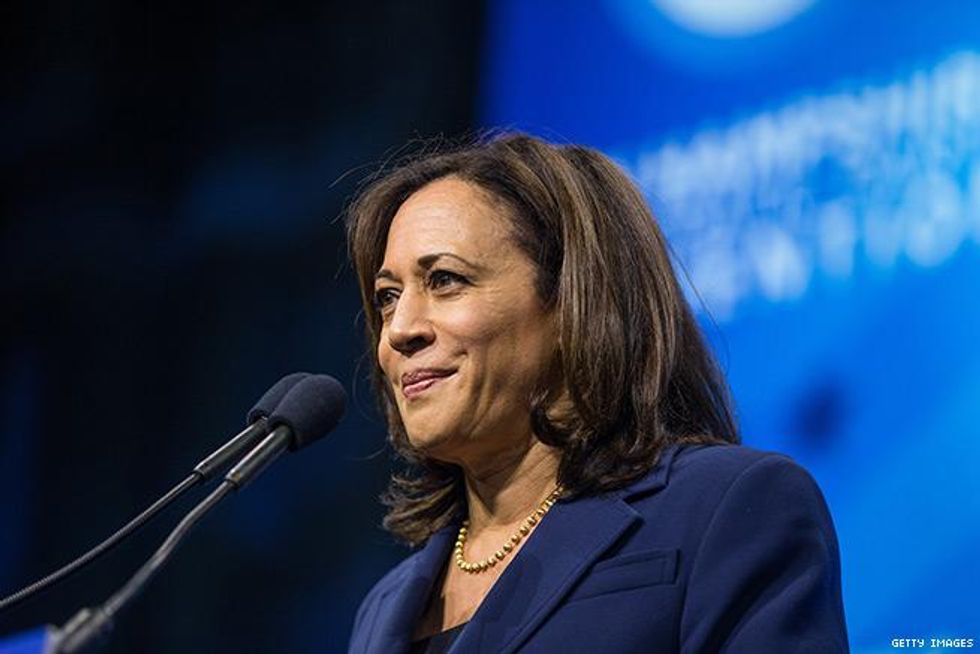
Kamala Harris, the former San Francisco district attorney and California attorney general, now a U.S. senator from the state, has a strong record of support for LGBTQ causes. In 2010, one of her signature issues in her campaign for attorney general was her opposition to Proposition 8, the voter-approved ballot initiative that revoked marriage equality in California in 2008. Both she and Jerry Brown, who was elected governor in 2010, said they would not defend Prop. 8 in court, and Brown's predecessor as governor, Arnold Schwarzenegger, had done the same. If Steve Cooley, Harris's opponent in the AG race, who had pledged to defend Prop. 8, had won, it might have changed the ballot measure's fate. As it was, the proposition's supporters had to defend it against court challenges, and courts all the way up to the U.S. Supreme Court agreed they didn't have legal standing to do so, and because of that Prop. 8 was struck down. As AG, she went on to lead efforts to abolish gay and trans "panic" defenses in criminal trials. Harris also showed her support for LGBTQ rights as San Francisco district attorney; in 2004, when Mayor Gavin Newsom declared same-sex marriage legal in the city, Harris conducted marriages for same-sex couples (the marriages were later nullified, however). She established a hate-crimes unit in the DA's office as well. As a senator, Harris has continued to be a champion of LGBTQ rights. She's introduced a bill to mandate insurance coverage of pre-exposure prophylaxis, the HIV prevention method, and she notably stumped Supreme Court nominee Brett Kavanaugh with a question on marriage equality during his confirmation hearings. This summer, however, she controversially attended services at the church of an anti-LGBTQ pastor in Las Vegas, as did Cory Booker, and Bernie Sanders had held a town hall there. Both Harris and Booker issued statements distancing themselves from the pastor and reiterating their support for equality. Harris also has said she supports decriminalizing sex work for consenting adults, but some advocates for sex workers have pointed to her history of resisting decriminalization, a position they say has hurt LGBTQ people.
Harris has pledged that if she is elected president, she would push for the Equality Act, reinstate Obama's executive orders banning anti-LGBTQ discrimination in federally funded programs, reverse the trans military ban, roll back Trump's "license to discriminate" orders, and fight for LGBTQ equality around the world. She supports adding a third gender option on federal identification cards and documents, and she has promised to appoint an attorney general who will aggressively prosecute hate crimes. "Kamala's message is simple: Our America is one where everyone is afforded equal rights, and that's the America we will fight for together," her campaign website states.
Julián Castro
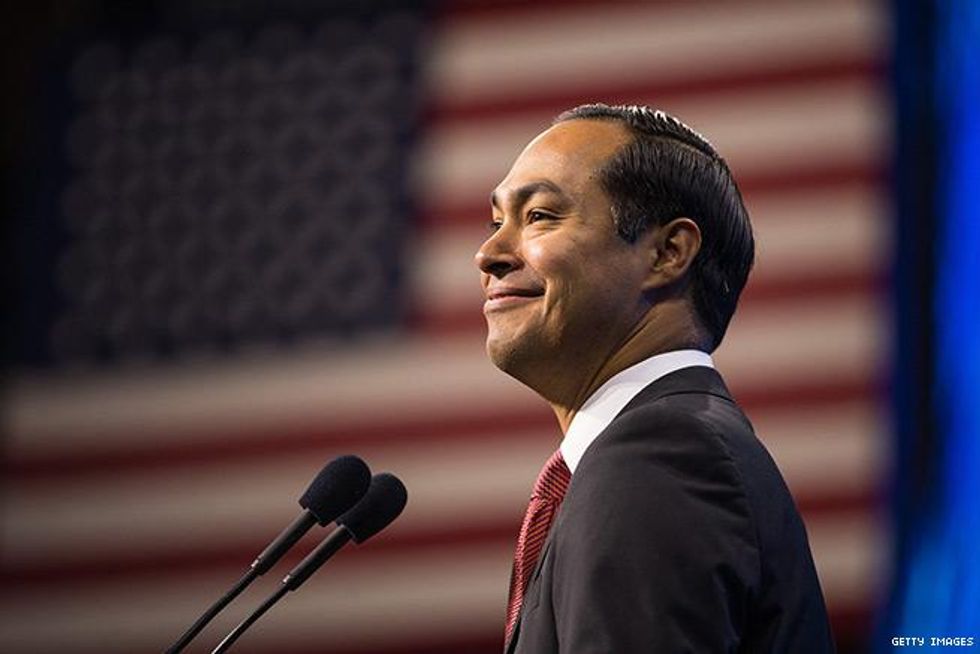
Julian Castro has been a backer of LGBTQ rights as mayor of San Antonio and secretary of Housing and Urban Development under President Obama. As mayor, he advocated for adding sexual orientation and gender identity to San Antonio's antidiscrimination ordinance, which the City Council did in 2013. He had also campaigned for domestic-partner benefits for city employees (pre-marriage equality), and the council added those in 2011. And he was the first mayor to be grand marshal of San Antonio's Pride parade. He gave the keynote speech at the Democratic National Convention in 2012, pointing out Republican presidential candidate Mitt Romney's opposition to marriage equality as one of several issues where Romney was on the wrong side. As HUD secretary, he announced that there would be no anti-LGBTQ discrimination in HUD-funded programs, and he continued to comment on Texas politics, appearing in a 2015 ad to urge Houston voters not to repeal that city's LGBTQ-inclusive equal rights ordinance (unfortunately, they did repeal it). At the first Democratic presidential debate this year, he advocated for equal access to health care for all Americans, including access to abortion, although he mistakenly mentioned abortion rights for transgender women instead of trans men. His campaign staff later clarified that.
He has said that as president he would champion the Equality Act, push for a nationwide ban on conversion therapy for minors, end the trans military ban, stop anti-LGBTQ discrimination in the immigration and citizenship systems, and end discrimination against gay and bisexual men in blood donation. He also would fight against discrimination in the adoption and foster care processes, see that homeless trans people have access to shelters appropriate for their gender identity, and direct federal resources to combat violence against trans people, particularly women of color. "Every person has the right to love who they want and identify as who they are," his campaign website states.
Amy Klobuchar
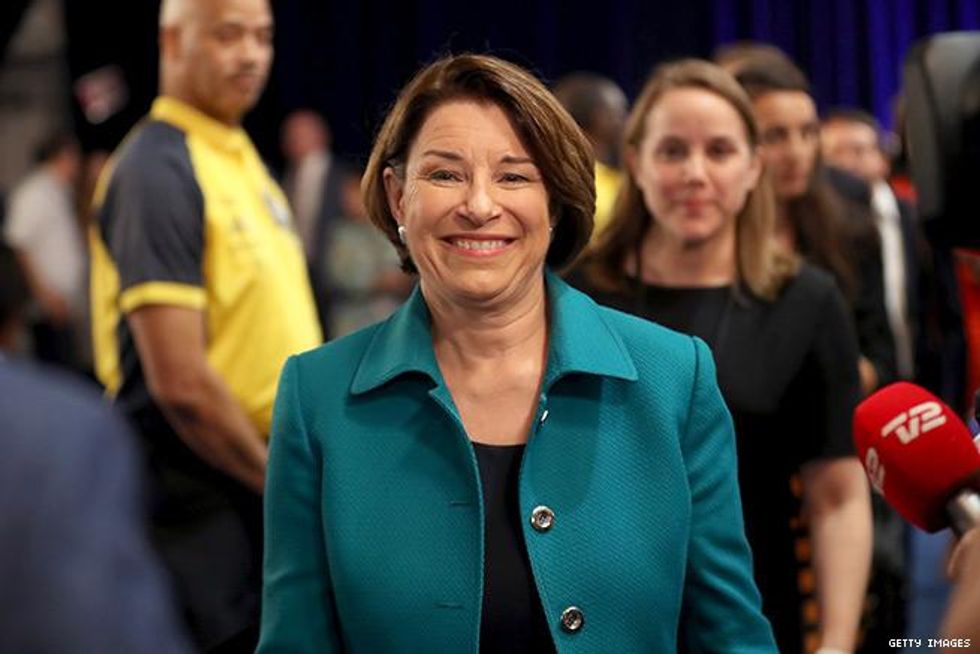
Amy Klobuchar was elected to the U.S. Senate in 2006, the first woman elected to that body from Minnesota. Before that she was Hennepin County attorney, running the largest prosecutor's office in the state. As a senator, she has racked up high scores on the Human Rights Campaign's Congressional Scorecard, initially in the 90s and more recently a string of perfect 100 scores. In 2009 she recommended Minneapolis assistant police chief Sharon Lubinski to be a U.S. marshal, and President Obama nominated Lubinski and the Senate confirmed her, making her the first openly gay person to hold such a post. In 2013, as vice chair of the Senate's Joint Economic Committee, she released a report showing that anti-LGBTQ discrimination is costly to employers because of the turnover it causes.
Among her first actions as president would be a reversal of the trans military ban and an end to the Department of Justice's arguments in court that anti-LGBTQ discrimination should be allowed despite the Civil Rights Act, along with stopping other federal efforts to enable discrimination, according to a first 100 days plan she released on Medium. She would seek passage of the Equality Act, which she has cosponsored as a senator, in the first year of her presidency. She has also pledged to expand efforts to reduce LGBTQ homelessness, address LGBTQ suicide rates, increase access to PrEP, and create an office of LGBTQ Antidiscrimination within the White House Domestic Policy Council, she noted in the Medium post
Beto O'Rourke
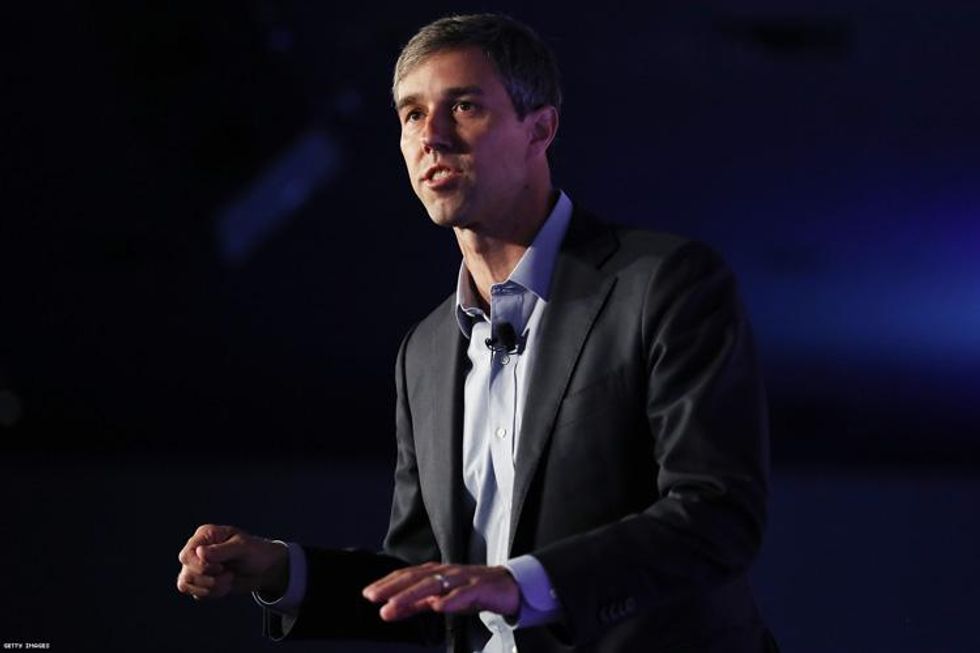
The former U.S. representative from Texas nearly unseated homophobe Ted Cruz in the 2018 Senate race, and he brought a largely pro-LGBTQ record with him to that race and the presidential contest. He began his political career as a member of the El Paso City Council, where in 2009 he persuaded his colleagues to approve domestic-partner benefits for partners of city employees, whether the partners were same-sex or opposite-sex. The move, which came when Texas and most other states still banned same-sex marriage, made El Paso one of the first Texas cities to offer the benefits. O'Rourke went on to serve three terms in the House, 2013-2019, and he received a perfect score of 100 on the HRC Congressional Scorecard for his first and third terms, an 85 for his second. HRC endorsed him in his Senate campaign, during which he notably spoke out against transphobia in response to a question from a transgender audience member at a town hall meeting in Dallas.
O'Rourke released an LGBTQ rights platform in June. He pledges to reverse the many anti-LGBTQ policies enacted by Donald Trump's administration, such as the ban on military service by transgender people, including any discharges resulting from it; the practice of discharging HIV-positive service members; efforts to allow discrimination in health care and in adoption and foster care; and expansion of religious exemptions to enable discrimination. He says he would reinstate Department of Education guidance aimed at protecting LGBTQ students and would consider federal civil rights law banning sex discrimination to include discrimination based on sexual orientation and gender identity, contrary to the Trump administration's reading of the law (the interpretation of the law was debated in the Supreme Court this week). He also says he would work with Congress to pass the Equality Act, which would amend the existing law to make clear that it does cover sexual orientation and gender identity. He promises to persuade Congress to pass other legislation of interest to LGBTQ people as well, such as a bill banning discrimination in adoption and foster care services and one to prioritize the research necessary to modernize blood donation policies that currently discriminate against gay and bi men. On international matters, he pledges again to improve the access to asylum for LGBTQ people fleeing persecution; work with allies to secure a global treaty aimed at preventing such persecution; invest in the Global Equality Fund, which provides assistance to LGBTQ rights groups; and establish a special envoy for LGBTQ rights within the State Department.
Joe Sestak
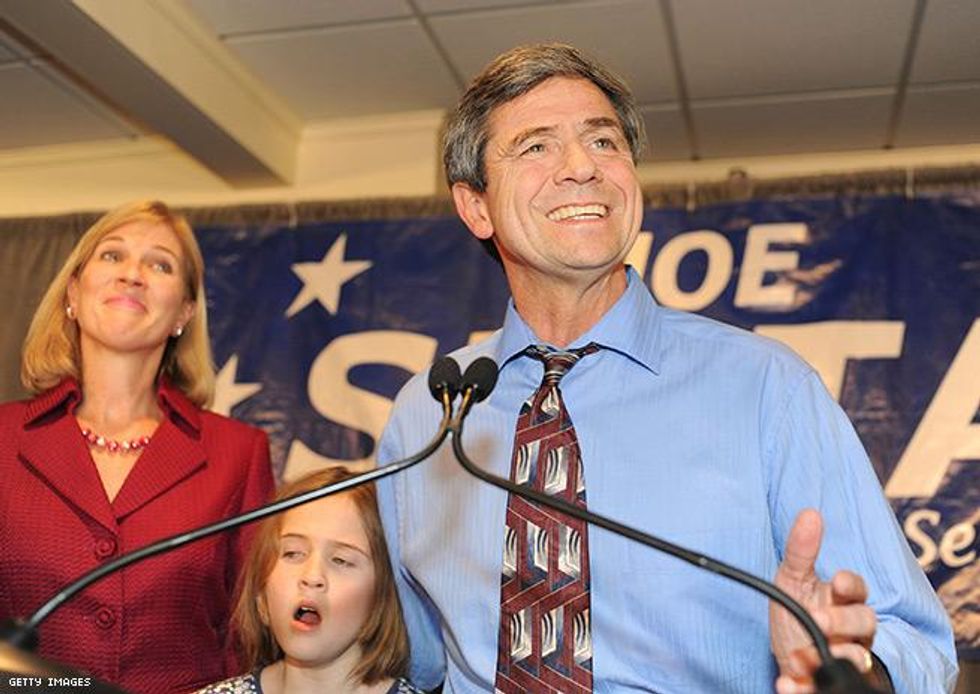
Joe Sestak served two terms in the U.S. House from a Pennsylvania district, spanning 2007 to 2011, and he received scores in the high 90s on HRC's scorecard. He was an original cosponsor of legislation to repeal DOMA, and he also cosponsored LGBTQ-inclusive hate-crimes legislation, ENDA, and the repeal of "don't ask, don't tell" (he had also opposed DADT as a military officer). "When asked, I was not afraid to tell my commanding officers how I felt," Sestak, who rose to three-star admiral in the Navy, says on his campaign website.
As president, he would reverse the trans military ban, push for passage of the Equality Act, oppose efforts to allow discrimination "under the guise of 'religious liberty,'" and seek to combat violence against LGBTQ people, "in particular the epidemic of violence against transgender people of color," his site notes. He would also back training programs to improve the interactions of police and first responders with LGBTQ people, and sign the Global Respect Act, which would let the U.S. bar entry to anyone known to have committed human rights violations against LGBTQ people. "As President, I will work proactively to include LGBTQ+ people in my administration, not only because I believe visibility and representation are important for the continued advancement of LGBTQ+ people in society, but -- again -- simply because this country needs the best of the best," he continues. "I will also work to support and recruit LGBTQ+ candidates for public office, because though they have made great strides -- with prominent LGBTQ+ legislators, mayors, and the first openly gay elected governor -- they are still underrepresented."
Tulsi Gabbard
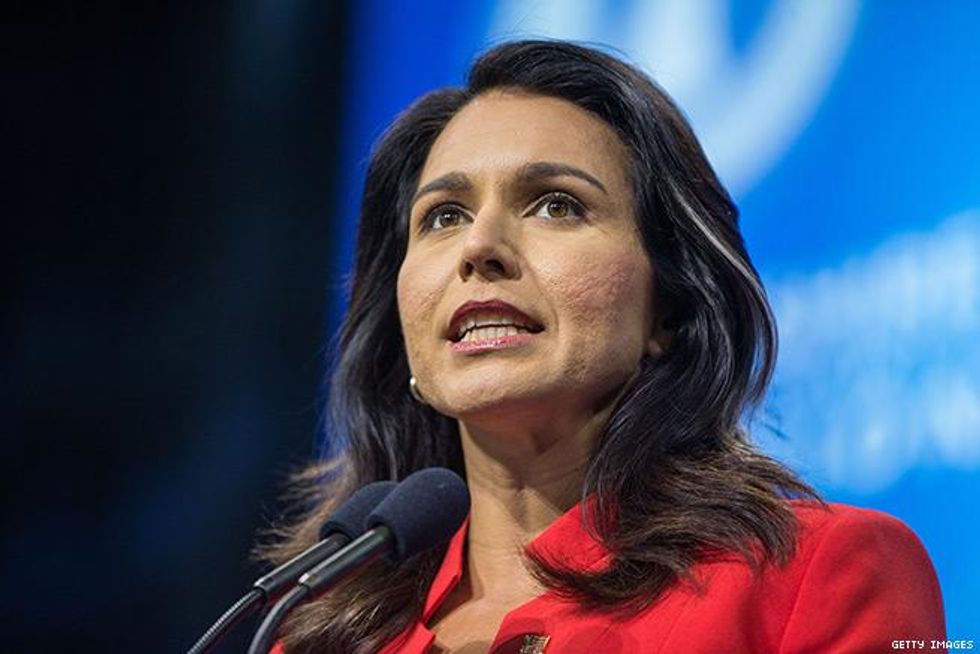
U.S. Rep. Tulsi Gabbard of Hawaii has a history of anti-LGBTQ stances, but she has apologized for them and said she no longer holds such views. In 2004, when Hawaii was considering a civil unions bill, Gabbard, then a state representative, decried "homosexual extremists." "To try to act as if there is a difference between 'civil unions' and same-sex marriage is dishonest, cowardly and extremely disrespectful to the people of Hawaii," Gabbard testified in February 2004. "As Democrats, we should be representing the views of the people, not a small number of homosexual extremists." Her father, Mike Gabbard, was a prominent anti-LGBTQ activist in Hawaii, campaigning against marriage equality and other LGBTQ causes. Now Tulsi Gabbard, who became the first Hindu member of Congress in 2013, supports marriage equality, the Equality Act, and other pro-LGBTQ policies and legislation. She is a member of the Congressional LGBT Equality Caucus and has received high marks on HRC's scorecard, including a perfect 100 in her most recent full term. "In my past, I said and believed things that were wrong, and worse, they were very hurtful to people in the LGBTQ community and to their loved ones," she said in a YouTube video posted in January after her 2004 comments resurfaced in light of her presidential campaign. She has attributed her previous views to her socially conservative upbringing, and said they changed when she served in the military with gay and lesbian colleagues.
Her campaign website notes her support for the Equality Act, her opposition to the trans military ban, her belief in marriage equality, and her endorsement of legislation to classify conversion therapy as consumer fraud.
Tom Steyer
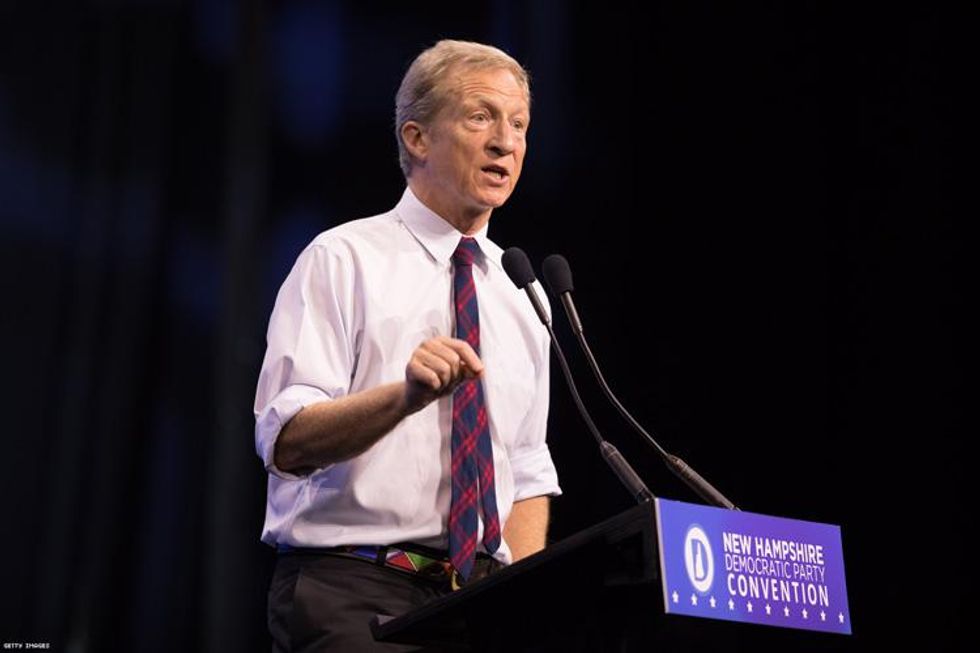
Steyer, who made a fortune as a hedge fund manager, has made large donations to LGBTQ and other progressive causes. The longtime San Francisco resident stepped down as head of his investment firm in 2012 to devote himself to philanthropy and political activism, and through his nonprofit organization, NextGen America, he has funded efforts to combat climate change, increase voter turnout, and advance social justice. In 2015 he received Equality California's Humanitarian Award for his work on behalf of LGBTQ causes. In 2016 he harshly criticized Donald Trump's choice of Mike Pence as his running mate. "I thought it was classic that Trump chose someone who had vilified another part of our community -- the LGBT part of our community," he said during a panel at the Netroots Nation conference. "[Trump] went out of his way to get a vice-presidential running mate who had actually gone after part of America that he hadn't personally gone after yet." In 2017 Steyer called for Trump's impeachment.
The "Civil Rights" section of his campaign website addresses LGBTQ rights. "Our government must be of, by, and for the people," it says. "That means all of us -- not just some. We must actively call out racism, white nationalism, LGBTQ and gender bias, as well as work to address the disparities still defining too much of American life. Tom's administration will vigorously defend the civil rights of all Americans, work across agencies to reform policies that reinforce inequality, and ensure justice in our housing, education, access to capital, environmental, agriculture, health, and human services programs, and election processes. Tom also strongly supports legislation to establish a commission to re-examine the issue of reparations."
Marianne Williamson
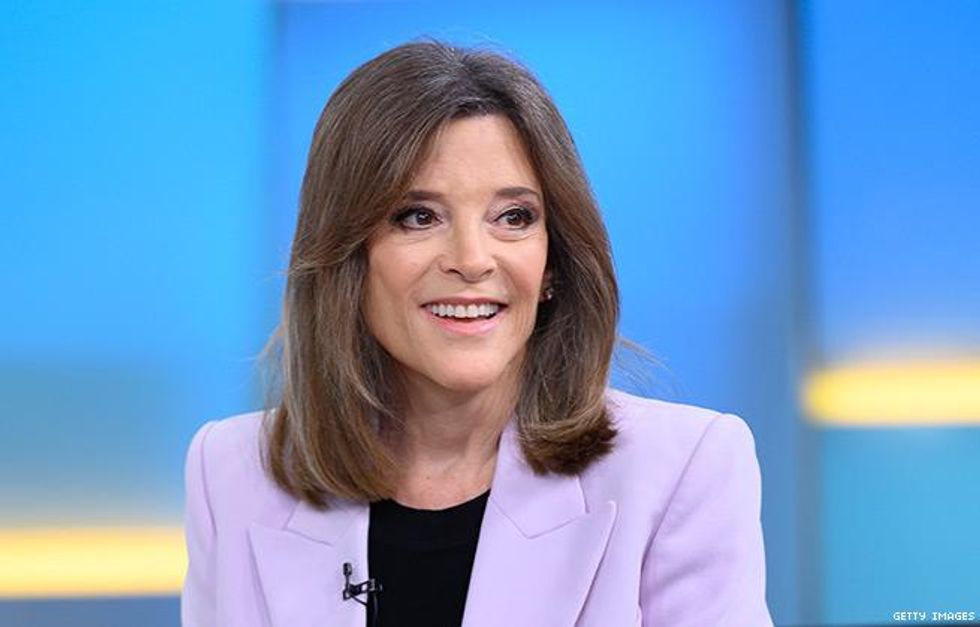
Marianne Williamson, a spiritual adviser and author of self-help books, has been a controversial figure in the presidential race and sometimes the subject of parody. She became well-known among LGBTQ people, particularly in Los Angeles, at the height of the AIDS crisis in the 1980s. "Williamson set up shop in a city full of gay men and made quick inroads in the entertainment industry; her message of an all-loving God offered a new home for gays who'd been rejected by their families or faith traditions," Christina Cauterucci wrote in Slate in August. "When Williamson founded a meal-delivery nonprofit serving AIDS patients [Project Angel Food, still in operation] and began leading AIDS support groups, her popularity among gay men grew." But since she launched her presidential campaign, some who knew her then have contended that she claimed negative thinking was a cause of AIDS and that positive thinking could cure it. Williamson has struck back, tweeting, "Please know both those things are complete and utter lies."
While her campaign is unorthodox, focusing on a message of love driving out fear, Williamson takes the same practical policy positions as most other Democratic hopefuls, promising to champion the Equality Act, reverse the trans military ban, end discrimination in adoption and foster care as well as in health care, fight religious exemptions to antidiscrimination laws, ban conversion therapy, restore cuts to HIV and AIDS programs, reinstitute Obama's nondiscrimination orders, and appoint an attorney general who will vigorously prosecute hate crimes. "In a Williamson administration, no LGBTQ+ person will feel unsupported by their government," her campaign website states. "They will live with the absolute knowledge that they and their rights are both honored and protected by the highest authorities in the land."










